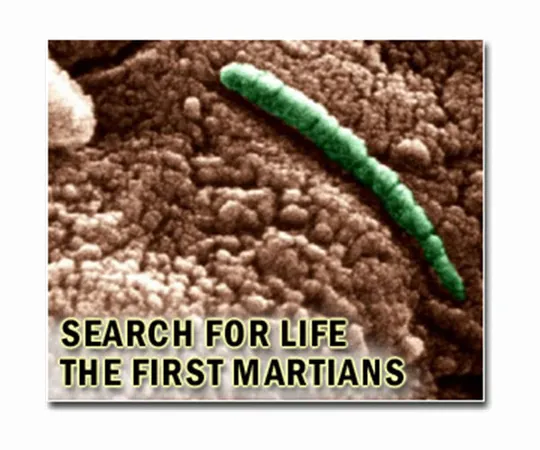
Engineering Microbes to Enable Human Life on Mars: A Bold New Frontier
2025-04-03
Author: Rajesh
Engineering Microbes to Enable Human Life on Mars: A Bold New Frontier
In an age where technology and biology intertwine like never before, synthetic biology stands at the forefront of revolutionary scientific advancements. Researchers now envision a future where engineered microbes pave the way for human habitation on Mars, transforming the Red Planet from a barren wasteland into a thriving ecosystem.
Synthetic biology, the practice of designing and modifying organisms for specific purposes, has its roots in innovative applications like golden rice, which combats vitamin A deficiency, and cutting-edge genomic technologies stemming from the Human Genome Project. This field is being hailed as the next significant frontier in biotechnology.
Microbes as Martian Allies
The potential use of microbes in space exploration may not be immediately obvious, but scientists are keenly exploring their applications. These microscopic organisms could play a crucial role in detoxifying Martian soil, where harmful perchlorates have been discovered.
Microbes that can withstand extreme environments on Earth—like the heat-loving Thermus aquaticus and resilient psychrophiles thriving in frigid temperatures—provide a blueprint for engineering extraterrestrial organisms. Scientists are particularly intrigued by extremophiles, organisms that withstand radiation, and even thrive in the harsh vacuum of space, making them ideal candidates for helping humans adapt to Martian conditions.
This opens up exciting possibilities: by engineering microbes that tolerate extreme cold and high radiation levels, we could create life forms capable of protecting habitats and facilitating agriculture on Mars.
Atmospheric Transformation
One of the pivotal roles that synthetic biology could play on Mars is transforming its thin, carbon dioxide-dominated atmosphere. Once home to flourishing cyanobacteria on early Earth, these organisms enriched our atmosphere with oxygen. Could they be engineered to do the same on Mars? By modifying these microorganisms to survive the Martian climate, we could theoretically produce vital gases like oxygen and nitrogen, setting the stage for a breathable atmosphere.
Accelerating Terraforming with Microbes
While traditional terraforming methods might take centuries, synthetic biology presents a faster route. Scientific proposals envision using engineered microbes to expedite ecological transformation, potentially allowing us to warm Mars' surface and promote a more hospitable climate. By utilizing organisms that reduce harmful greenhouse gases and produce oxygen, we may not only facilitate human colonization of Mars but also create positive effects on Earth’s environment.
Ethical Considerations and Future Prospects
As we tread into this uncharted territory, ethical discussions regarding the engineering of life and its spread beyond Earth become increasingly paramount. It’s essential to weigh the implications of introducing synthetic organisms into extraterrestrial ecosystems carefully.
Recent research from Macquarie University supports the notion that synthetic biology could revolutionize food supplies on Mars. By developing fortified crops with enhanced nutritional qualities and shelf life, we could ensure the sustainability of human life on the planet—not to mention, provide critical insights for improving agriculture on Earth.
Conclusion: A New Era of Exploration
The idea of colonizing Mars may seem like science fiction, but synthetic biology is transforming this vision into a tangible reality. As biotechnology firms and space agencies invest in this frontier, we're standing on the brink of becoming an interplanetary species. The fusion of cutting-edge science and the quest for survival beyond our planet exemplifies human ingenuity and the endless possibilities that lie ahead. Are we ready to embrace this brave new world? The future is here, and it is microbial.





 Brasil (PT)
Brasil (PT)
 Canada (EN)
Canada (EN)
 Chile (ES)
Chile (ES)
 Česko (CS)
Česko (CS)
 대한민국 (KO)
대한민국 (KO)
 España (ES)
España (ES)
 France (FR)
France (FR)
 Hong Kong (EN)
Hong Kong (EN)
 Italia (IT)
Italia (IT)
 日本 (JA)
日本 (JA)
 Magyarország (HU)
Magyarország (HU)
 Norge (NO)
Norge (NO)
 Polska (PL)
Polska (PL)
 Schweiz (DE)
Schweiz (DE)
 Singapore (EN)
Singapore (EN)
 Sverige (SV)
Sverige (SV)
 Suomi (FI)
Suomi (FI)
 Türkiye (TR)
Türkiye (TR)
 الإمارات العربية المتحدة (AR)
الإمارات العربية المتحدة (AR)